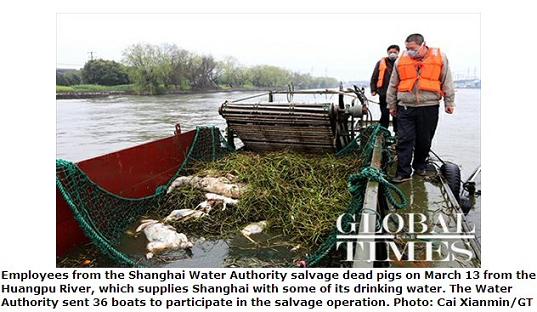
 |
It is unlikely that farmers in Jiading district dumped the five dead pigs that were recently found floating in a river in Jiading district, a district press officer said Tuesday.
Residents found four pig carcasses in the Hengjing River Sunday, according to a report on the news website xinmin.cn. They discovered another pig in the river the next day, but could not determine where it or the others came from.
"It is unlikely that the pigs came from local farms," said Zhou Xiang, a press officer with the Jiading district government. "Local farms have to register their pigs with the agriculture authorities and must put identification tags on each pig's ear."
The pigs found Sunday and Monday did not have ear tags, according to the report.
Zhou said that local farmers have little reason to dump the dead pigs because the municipal government compensates them for their losses. "Why would they dump the pigs when they can exchange them for money?" he told the Global Times.
Shanghai's farmers can get 50 yuan ($8.06) in compensation for each dead pig, said Wu Jianping, the director of the executive team of the Jiading District Agricultural Committee.
"The city has been collecting dead pigs for disposal since 2009," Wu told the Global Times. "The government has assigned vehicles and employees to collect the dead pigs and record their information. Farmers can get compensated once each year."
The city government also provides farmers with free vaccine for their pigs, unlike in some other provinces, where farmers have to cover the cost by themselves, Wu said.
The pig carcasses were already severely decomposed when they were found, so they weren't tested for diseases, Wu said. The five carcasses were either buried in Jiading or sent to a municipal disposal center.
Zhou suggested that the pigs floated down the Hengjing River, which is fed by another river that runs through Taicang, Jiangsu Province.
An official from the Taicang city government told the Global Times that they had also found dead pigs in the river, but suggested that they came from Changshu, Jiangsu Province.
A Changshu government official told the Global Times that she had not heard anything about the incident.
Latest development of H7N9 in China[Special]
















 Stand in face of bulldozer
Stand in face of bulldozer
With water and electricity cut, lonely 'Nail House' struggling to stay


![]()
